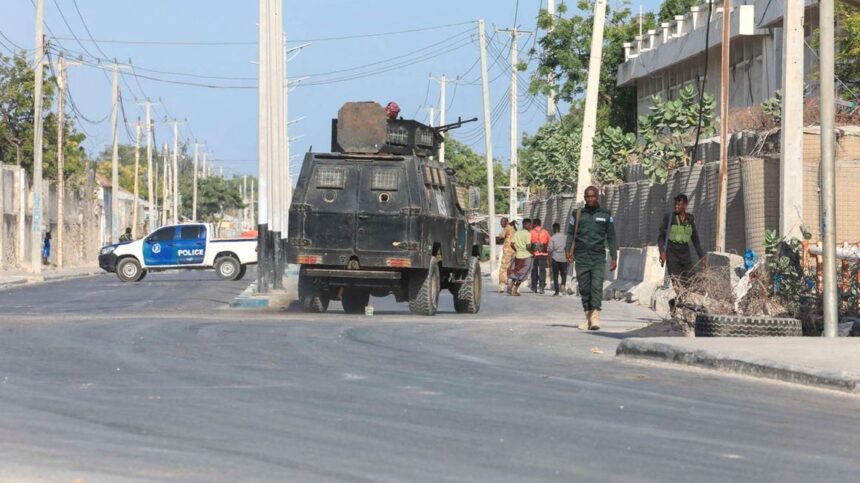Somalia is a few steps away from officially joining the East African Community (EAC), a move that has elicited mixed reactions as the country is still roiled by civil conflict.
On Friday, Somalia issued a public statement noting that the seven presidents of the EAC countries had signed off the verification report, paving the way for its admission into the bloc.
While Somalia’s membership into the EAC comes with several benefits to the member states—including increasing intra-regional trade by linking Africa to the Arabian Peninsula through its national long coastline—there are also fears that the insecurity in the country could easily spill over to other countries.
A verification team comprising experts from the EAC Partner States were in Somalia from January 25 to February 3, 2023, to establish the country’s level of conformity with the criteria for admitting foreign countries into the EAC.
The technical team reviewed Somalia’s institutional and legal frameworks policies, strategies, and programmes; and its areas of cooperation with the EAC.
It also assessed Somalia’s development strategies and plans in key areas of collaboration including infrastructure, energy, education and science, peace and security, and international cooperation.
With the adoption of the report by the Verification Mission to Somalia, the Council of Ministers is now expected to commence and conclude negotiations with Somalia for admission into the bloc.
“The Federal Republic of Somalia warmly welcomes the adoption of the ‘Verification Report’ on its application by the East African Community Heads of State, which was reviewed and deliberated at the 21st Extraordinary Summit held on May 31 in Bujumbura, Burundi,” reads part of the statement.
“The adoption of the verification report is a noteworthy milestone and testament that Somalia will be a great addition to the EAC sisterly countries and contribute to the integration and the prosperity of the region,” the statement went on.
Should Somalia be admitted into the EAC it will be the eighth member of the trade bloc. It has a population of 17 million people and hopes that its admission into the bloc will help other countries exploit its blue economy while also enhancing the movement of goods, services and people in the region.
Democratic Republic of Congo (DRC) is EAC’s newest member of the regional body which also includes Kenya, Uganda, Tanzania, Burundi, Rwanda and South Sudan. Some countries like Tanzania and Burundi have been opposed to Somalia’s admission.
“What has been bothering Tanzania is the aspect of immigration. Because once you open up, they (the citizens of Somalia) can go to Tanzania and stay there by right. The protocol admits free movement of persons,” said Kennedy Manyala, an economist who previously worked with the EAC Secretariat.
Although there have been sporadic attacks by the terrorist outfit Al Shabaab, Somalia has largely been peaceful, thanks in part to the peacekeeping role that has been played by some of the EAC member states through African Union Mission in Somalia (AMISOM).
Some of the countries that have contributed troops to AMISOM, which has since been reconfigured into the African Union Transition Mission in Somalia (ATMIS), include the EAC member states of Kenya, Uganda and Burundi.
Somalia shares a border with Kenya to the East. One of the first requirements for a country to be admitted into the EAC is to share a borderline with at least one member state.
But for a country to be admitted into the EAC, it must also have strong democratic institutions.
President Hassan Sheikh Mohamud, who won the presidential polls in May last year, had attempted to join the EAC in his first term between 2012 and 2017.
The board bloc initially refused the application, citing sporadic conflict and weak institutions in Somalia.
But Mogadishu’s hope of getting admitted into EAC was rekindled after an equally troubled South Sudan was admitted in 2016.
Dr Manyala reckons that Somalia’s application should be rejected as the country has all the markings of a failed state, with sporadic attacks by the militant group Al Shabaab.
The Somali government insists that it has been working on making the country safe.
There has been increased influence from the Somalian community in Kenya and other EAC member states.
Armed with cash from the diaspora, most of them have ventured into various economic sectors from hospitality to wholesale and retail.
“Somalia belongs to the East African Community. There is no country among the EAC Partners States that is not linked by business with Somalia and existing historical linkages include language and culture,” said President Mohamud in October last year.
Source: businessdailyafrica





